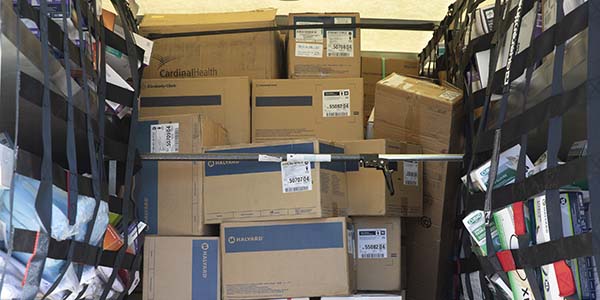University-wide donations and research helping community in response to COVID-19 pandemic

Efforts include coordination among the Office of Emergency Management, Harpur College of Arts and Sciences, the School of Pharmacy and Pharmaceutical Sciences, Decker College of Nursing and Health Sciences, the Thomas J. Watson School of Engineering and Applied Science, athletics and more.
“Individual members of our community became aware of community needs and realized there were available supplies that could help,” says Dave Hubeny, executive director of the Office of Emergency Management. “These individuals worked with their campus department or college dean to connect with community partners to ensure the equipment was made available where it was needed.”
Hubeny has coordinated the donation of 6,497 N95 masks and 17,650 earloop masks directly to University Health Services. They have also sent 6,751 gowns and 166,475 gloves to the Broome County Emergency Operations Center (EOC). The EOC manages all donations and prioritizes that they go to where they are needed most.
Students at the School of Pharmacy and Pharmaceutical Sciences are making an impact on a daily basis.
“Many of our pharmacy students, who are in technician and intern roles, are still working in community pharmacy environments at chain pharmacies, grocery store pharmacies and at hospitals,” said Sarah Lynch, clinical assistant professor and director of skills education at the School of Pharmacy. “They are helping patients through this time and I’m pretty proud of them.”
In addition, the school has provided supplies to local hospitals and ambulance services, as well as gowns and gloves to Good Shepherd Communities nursing homes. The school has also sent N95 masks to Lourdes Hospital Ascension and surgical masks to ambulance services and nursing homes.
The Innovative Simulation and Practice Center (ISPC) at Decker College of Nursing and Health Sciences recently answered the call of two local nursing homes that were running low on supplies — Good Shepherd Communities and Bridgewater Center for Rehabilitation and Nursing. According to Patti Reuther, ISPC director, the center split its on-hand supplies between the two organizations, providing each with 40 N95 masks and 50 central line dressing kits that include face masks.
Decker alumni, students and faculty are also among the healthcare providers caring for those infected with the COVID-19 virus.
“I couldn’t be prouder of our Decker nurses,” said Dean Mario Ortiz. “They put aside their fears and sacrifice time with their loved ones to care for others.”
And more than three dozen Harpur College faculty and staff have offered up the contents of their labs, including from biological sciences, psychology, anthropology, chemistry, physics, history, art and design, geography, geological sciences, integrative neuroscience, the First-year Research Immersion, and Classical and Near Eastern Studies. Items donated include hand sanitizer and tissues, surgical masks, safety glasses and lab coats, cleaning supplies and sterile surgical instruments as well as thermocyclers, DNA spin columns and the use of 3D printers.
English Professor Liz Rosenberg has been sharing public readings on Facebook twice a day at 11:11. Mornings feature children’s literature and evenings feature poetry for adults.
The inspiration came by way of her son Eli, who reminded her of Mr. Rogers’ famous quote: “When I was a boy and I would see scary things in the news, my mother would say to me, ‘Look for the helpers. You will always find people who are helping.’”
“So I thought, ‘How can I be a helper?’ And that’s what came to hand,” said Rosenberg, who is also a member of the Binghamton Board of Education. “I love children’s books, I write children’s books and I have children’s books. I’m also on the Binghamton City School Board and have been thinking a lot about kids and their families stuck at home.”
The Watson School has worked with Lourdes Hospital Ascension and UHS to develop 3D-printed ventilators that will allow more than one patient per machine if necessary. Researchers there are also working on designs for reusable N95-style face masks and a method to sterilize N95 masks so they can be used more than once.
It’s all part of a University-wide effort that continues to grow.
“The University is currently working to identify all surplus PPE and provide that equipment to the Broome County EOC,” said Hubeny. “Any campus department that has surplus equipment may contact the Binghamton University Office of Emergency Management (oem@binghamton.edu) to support the community’s current needs.”

